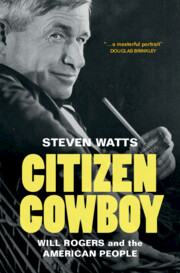Book contents
- Citizen Cowboy
- Additional material
- Citizen Cowboy
- Copyright page
- Epigraph
- Contents
- Plates
- Author’s Note
- Introduction
- 1 The Final Frontier
- 2 The Cherokee Kid
- 3 The Vaudeville Romance
- 4 Follies and Frolics
- 5 The Celluloid Cowboy
- 6 An Age of Publicity
- 7 The American Soul
- 8 Politics is Applesauce
- 9 The Unfunny Business of Trying To Be Funny
- 10 The Private Man
- 11 The Little Fellow and the Great Depression
- 12 Man in Motion
- 13 The Man Talkies Were Invented For
- Epilogue
- Acknowledgments
- Abbreviations
- Notes
- Index
9 - The Unfunny Business of Trying To Be Funny
Published online by Cambridge University Press: 16 August 2024
- Citizen Cowboy
- Additional material
- Citizen Cowboy
- Copyright page
- Epigraph
- Contents
- Plates
- Author’s Note
- Introduction
- 1 The Final Frontier
- 2 The Cherokee Kid
- 3 The Vaudeville Romance
- 4 Follies and Frolics
- 5 The Celluloid Cowboy
- 6 An Age of Publicity
- 7 The American Soul
- 8 Politics is Applesauce
- 9 The Unfunny Business of Trying To Be Funny
- 10 The Private Man
- 11 The Little Fellow and the Great Depression
- 12 Man in Motion
- 13 The Man Talkies Were Invented For
- Epilogue
- Acknowledgments
- Abbreviations
- Notes
- Index
Summary
Chapter Nine explores Rogers’ humor, which was the common denominator in his wide-ranging endeavors as a public figure . It argues that he was the heir of a homespun, cracker-box tradition of comic commentary dating back to Benjamin Franklin and continuing through Artemus Ward, Petroleum V. Nasby, Mr. Dooley, and Mark Twain. Rogers presented a comic persona composed of common sense, a puncturing of pretense and pomposity, and a head-shaking, chuckling exposure of the absurdities of modern values and traditional prejudices alike. He did not tell jokes but offered witty reflections on the conundrums of modern life, appearing as a rustic sage cracking wise at the local general store. Moreover, while Rogers took pains to present his humor as spontaneous, it was actually meticulously prepared. Ultimately, by joking about the tensions, incongruities, and dislocations of a rapidly modernizing society, he helped Americans come to terms with enormous changes affecting their lives. Their rapturous reception made Rogers the leading American humorist of early twentieth-century America.
Keywords
- Type
- Chapter
- Information
- Citizen CowboyWill Rogers and the American People, pp. 227 - 247Publisher: Cambridge University PressPrint publication year: 2024

